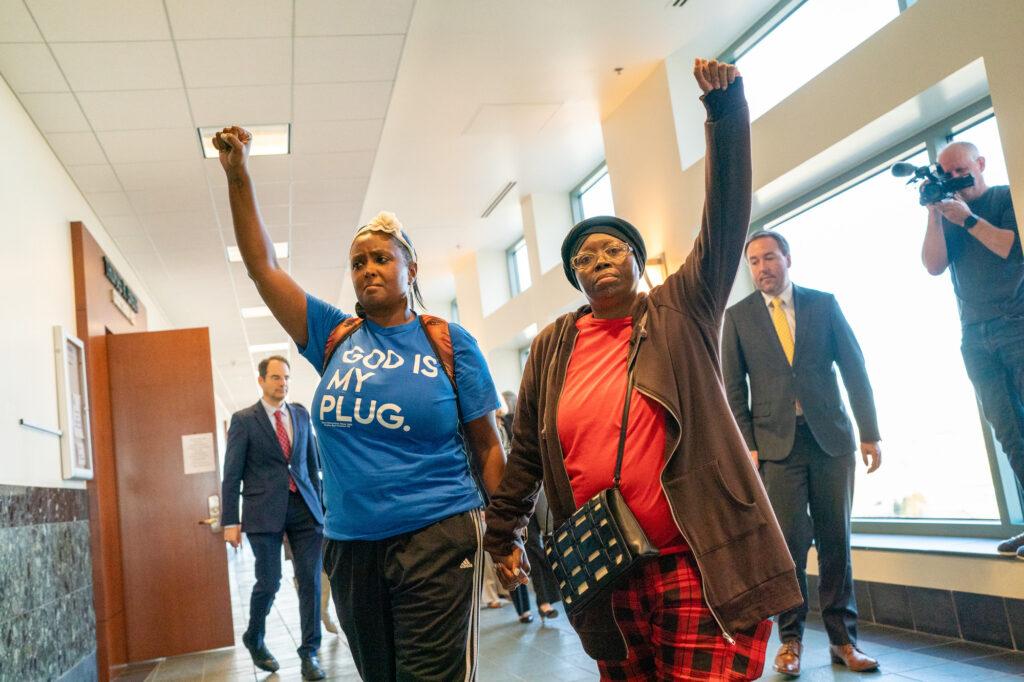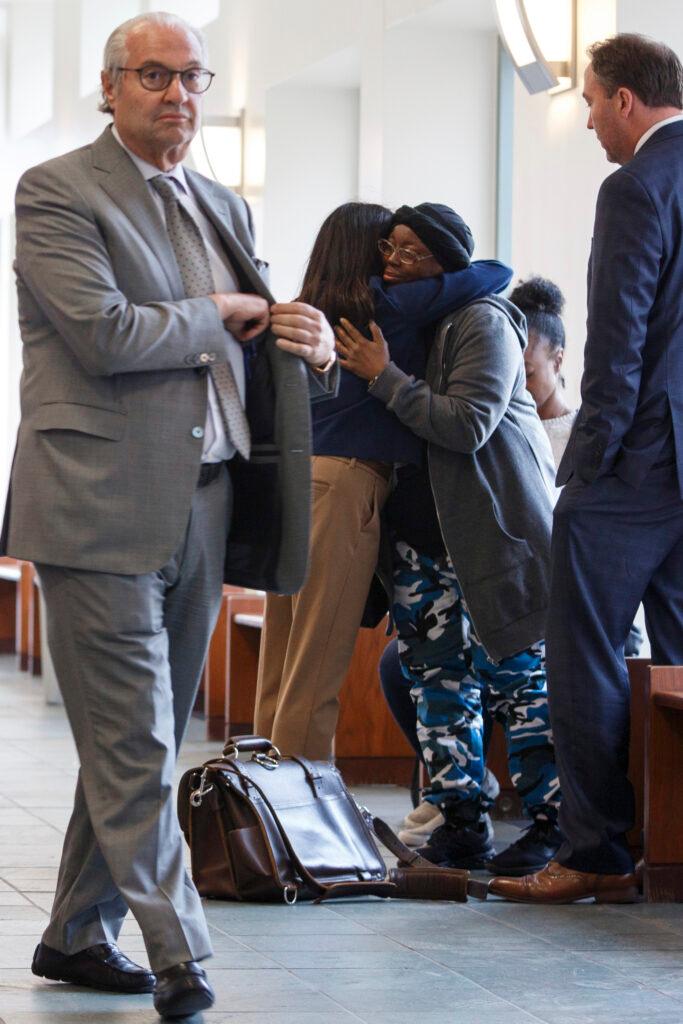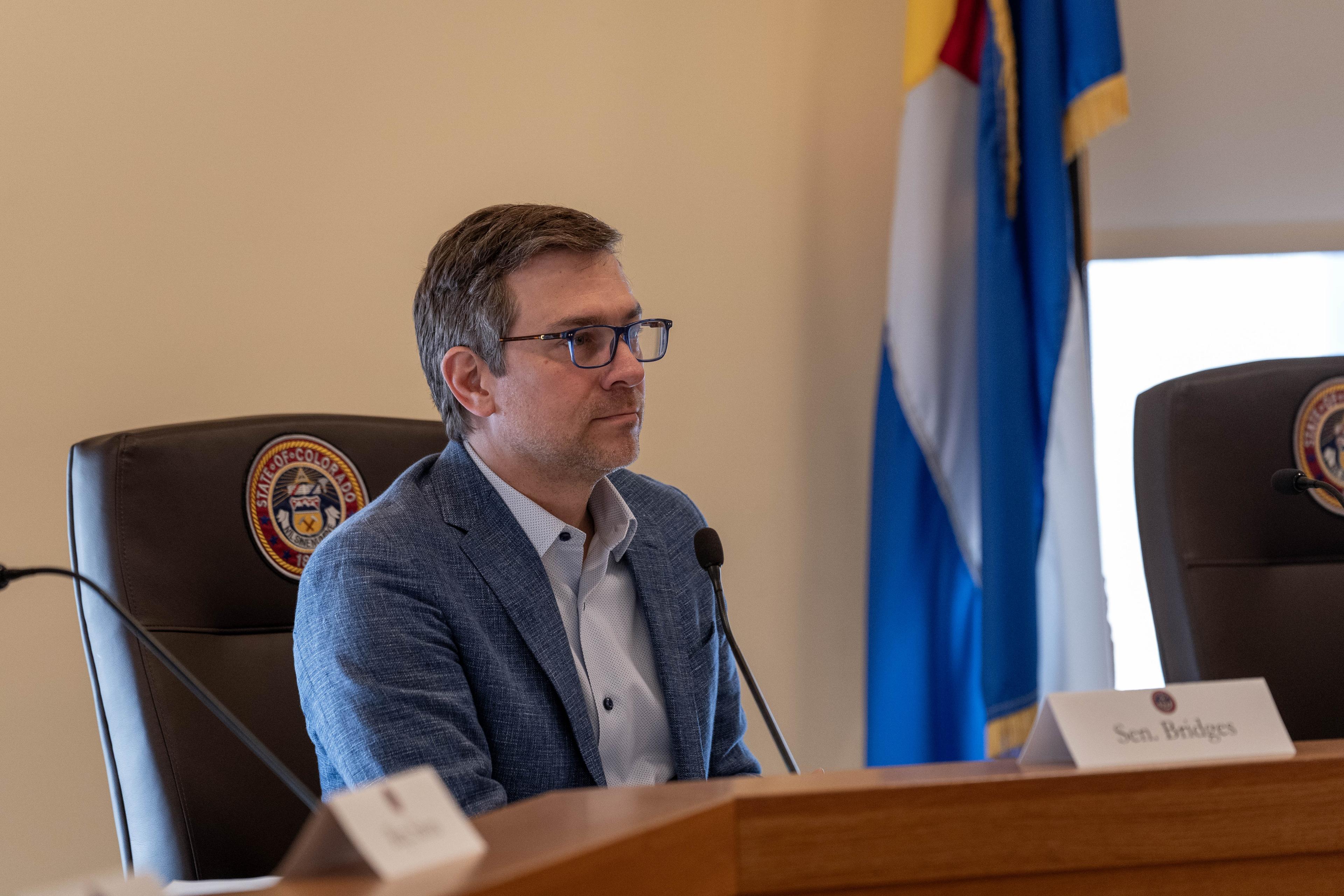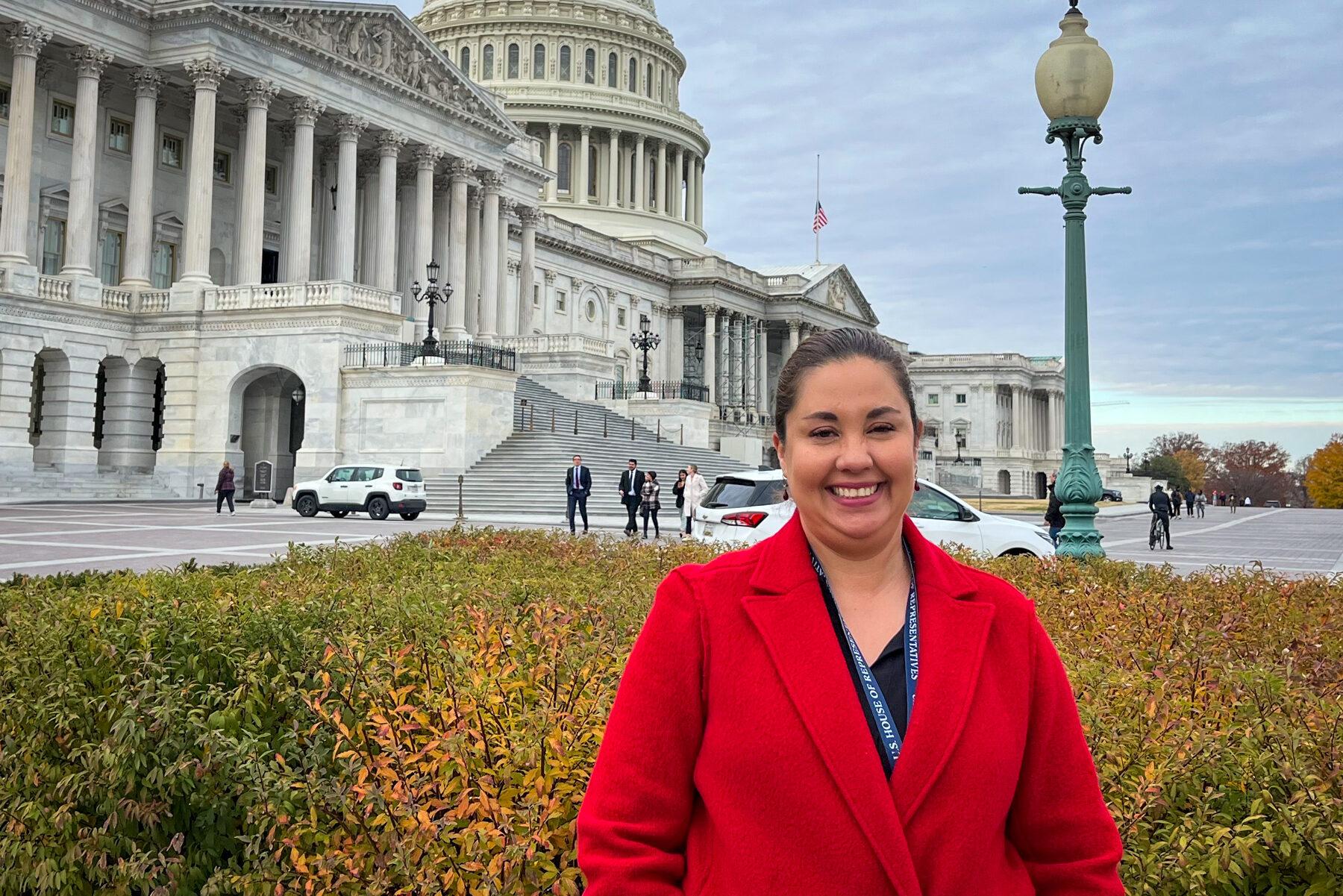
Hours before opening arguments in the first trial of Aurora police officers charged in the death of Elijah McClain, an APD undercover intelligence officer, some 20 miles from her jurisdiction, walked the hallways and sat inside the courtroom around the Adams County Justice Center to see what she could learn.
Lawyers were still trying to pick a jury. Media roamed around. But otherwise it was quiet.
One prospective juror, number 14, caught her attention. While being questioned by prosecutors and the lawyers for the officers on trial in McClain’s death, he mentioned having had previous run-ins with police and how he was brought up to fear police.
A short time later, the APD undercover officer was waiting in line to use the restroom when she said she overheard the man on a phone call in the hallway, speaking in Spanish about his feelings toward police.
“Odio la policia,” she said she heard him say. I hate the police.
Those three words, which the prospective juror later said he could not recall saying, brought jury selection to a standstill, delayed opening statements and led to a meeting between Colorado Attorney General Phil Weiser and then-Aurora Police Chief Art Acevedo.
The incident, which all took place in private conversations by phone and text message and in the judge’s chambers, has not been previously reported.
The officer was sent to the courthouse, city officials say, to see if anyone was potentially planning to attack the APD headquarters.
Though that officer never reported gathering any information about protests during jury selection, APD’s decision to place an undercover officer in the courthouse that day who listened to jurors eventually led to the exclusion of a juror of color, prospective juror 14, from the panel.
It also later led to the removal by APD of the intelligence officer from the Adams County Justice Center.
Aurora officials, including City Manager Jason Batchelor and Chief of Public Safety and City Attorney Manager Pete Schulte, didn’t believe it was noteworthy that their police department sent an undercover officer well outside of Aurora’s jurisdiction to monitor jury selection -- or that APD ultimately notified the defendant facing felony charges about that overheard conversation.
Lawyers for the officers then successfully moved to strike juror 14 from the panel.
How we reported this story
CPR News got this exclusive story through conversations with sources, open records requests to the state attorney general’s office and filing a motion with District Court Judge Mark Warner to unseal transcripts that were being withheld from the public because these proceedings were held in the judge’s chambers.
Warner ultimately agreed to unseal the 86 pages of direct examination and questioning of both the Aurora Police undercover officer and prospective Juror Number 14. That hearing was was held Sept. 20, 2023, just hours before the opening arguments in People vs. Randy Roedema and Jason Rosenblatt. Both officers were charged in the death of Elijah McClain. Roedema was ultimately convicted of criminally negligent homicide and assault.
City officials say the officer was there to gather intelligence on any protesters who attended, but the officer acknowledged she was there for another reason, as well.
“It sounds like you were paying attention to the inquiry of the jurors. Is that correct?” asked assistant attorney general Jason Slothouber to the officer in the judge’s chambers.
“Yes,” she said.
She said she particularly took notice of juror 14 because he may have a “slight bias because of his run-ins with police,” she said.
At the time, one of those on trial, Randy Roedema, was still an Aurora employee. The other, Jason Rosenblatt, had already lost his job.
Ultimately, Rosenblatt was cleared of all the charges filed against him. Roedema was convicted of criminally negligent homicide and assault. He was sentenced to 14 months in jail and probation. He appealed that conviction last week.
Weiser didn’t want to comment on the transcripts obtained by CPR News through filing a motion to unseal the documents with Judge Warner. He has continually said he wanted to ensure fair trials for McClain.
Elijah McClain was a 23-year-old Black massage therapist walking home from a convenience store in 2019 when he was stopped by three police officers, given two carotid holds and forcibly restrained. He was then involuntarily given a large dose of ketamine for his body weight and died from the interaction.
The three responding officers and the two paramedics who administered ketamine were charged in his death and tried last year. One officer and two paramedics were ultimately convicted of crimes. Everyone charged in McClain’s death was white.
The fight about juror 14, a man of color with a Hispanic surname, according to court transcripts, started because defense attorneys wanted him out.
After CPR News filed a motion, the judge agreed to unseal the court transcripts earlier this month and the juror’s name was redacted.
Those attorneys, Harvey Steinberg and Don Sisson, represented Rosenblatt and Roedema respectively.
Juror 14 was amid dozens of potential jurors dismissed during days of questioning of several hundred people summoned to the Adams County Justice Center.
But prosecutors objected to this particular person, telling the judge that it appeared that there were race-based reasons the juror was dismissed, according to the transcripts.
Just hours before prosecutors and defense attorneys delivered opening arguments in the Rosenblatt and Roedema trial, a fight spilled into the closed doors of the judge’s chambers, out of earshot of the public.
Both sides made a case about juror 14, who prosecutors apparently saw as a vital contribution to a jury whose composition appeared to be mostly white.
Lead prosecutor Slothouber told the judge that there was a “consistent pattern” during the jury selection process that defense attorneys struck potential jurors who had Latino surnames.
“I believe 11 jurors … were stricken for cause who had indicated on their questionnaires they could be fair and impartial but had Hispanic surnames,” Slothouber said, according to the transcripts. “This is not an accusation that anybody is actually racist, but that it appears race-based reasons may be the reasons for these strikes.”
Defense attorneys also complained that prosecutors were only striking white jurors.
Ultimately, Warner agreed with Slothouber that juror 14 was struck by defense attorneys for race-based reasons and the judge put him back in the mix.
Then Steinberg, Rosenblatt’s defense attorney, spoke up again.
“I didn’t want to use this because it involves intelligence by the Aurora Police Department, but … we have been advised that one of the intelligence officers who was here for security heard this juror speaking on the phone in Spanish … and the juror was overheard saying in the conversation, ‘I’m glad I’m on this jury because I hate cops.”’
Slothouber quickly responded, “if this was real, how could they not bring this to the court’s attention earlier and ask for him to be asked about this in chambers?” he told the judge. “If he said he hates cops and they hid that information from the court and didn’t raise this as a challenge for cause until now, this reeks of disingenuous bad-faith behavior that is just trying to save their race-based strike of juror 14.”
That APD would send staff to support their officers during a trial is not necessarily unusual. Departments as large as Aurora or Denver have wellness officers and supervisors who help and support staff through difficult moments. Though Rosenblatt had been fired already from APD, Roedema was still technically on leave from the agency and employed — until he was convicted.
But to conduct an undercover operation outside of the agency’s jurisdiction to monitor the details of jury selection is rare, three elected prosecutors told CPR News. All declined to go on the record because they didn’t have any dealings with this case.
“I’m flabbergasted,” said one elected prosecutor. “The sanctity of jury selection was invaded by law enforcement.”
Mitch Morrissey, a former elected district attorney from Denver, said he had never heard of plainclothes officers working undercover at a courthouse — except in cases when a defendant posed a safety risk and was out on bond.
But, as for listening in to jury selection, he said, “I don’t know if you should be doing that but I don’t think they were breaking any laws.”
“Courthouses are public buildings. I’ve seen courtrooms lined with cops,” Morrissey said. “If it was like they were hiding in chambers and listening to things taking place in camera, that’s a problem. But if they’re in a hallway, then I don’t see the problem.”
On that morning ahead of opening arguments on Sept. 20, 2023, Judge Warner then brought the undercover officer, whom CPR News is not naming at APD’s request, into his chambers in front of both sets of attorneys and put her under oath.
The officer told the judge that she was there to listen in and gather intelligence on whether there was a potential threat to the APD municipal building, about 25 miles away.

In July 2020, amid roiling protests in Denver and Aurora after George Floyd’s murder and anger around McClain’s death, demonstrators gathered around the police headquarters near the Aurora Municipal Building and officers were stuck inside the building for seven hours. No one was injured, but officials at APD still talk about the incident often as one of the most frightening moments for officers that summer.
In the judge’s chambers, Steinberg said that the officer was “assigned” to the hallway, though she said she overheard the juror speaking on his phone waiting in line for the restroom, according to the transcripts.
“I couldn’t hear the entire conversation,” the officer said to the judge and the lawyers. “I overheard him saying that he was glad to be here, that he didn’t like police officers, that was the gist of what I heard.”
The APD officer acknowledged she could hear juror 14 having a phone conversation in Spanish, which was also her first language, and that she heard him say, “odio la policia,” or “hate the police,” as he paced the hall.
The officer said she told an Adams County deputy that a potential juror was on the phone and possibly talking about the trial, but she didn’t offer details of what she heard him say.
She also then told her supervisor, who instructed her to tell one of the APD wellness sergeants who was also there during jury selection. One of the supervisors responded, “I’ll pass this along, you might have to testify,” she told the judge, under oath.
The officer also said to the judge that her supervisor asked if she “recognized” a potential juror.
Ultimately, that sergeant texted the defendant Rosenblatt, who passed the information along to his attorney, Steinberg. No one told prosecutors or the judge until the in-chambers proceeding.

In a text message CPR received from an open records request, former APD police chief Art Acevedo sent the text the wellness sergeant sent to Rosenblatt to Attorney General Phil Weiser and the Aurora City Attorney Pete Schulte.
“Yo!” the sergeant typed to his former colleague, whose trial was about to start. “Plainclothes officer heard juror 14 speaking in Spanish yesterday saying specifically that “he hates cops and is glad he is on the jury…Just wanted to get that to your attorneys..”
Acevedo didn’t return calls from CPR News for comment.
The judge then brought in juror 14, who has never been publicly identified, to the chamber.
The man said he calls his mother in Honduras frequently to chat about his life and that he did call her the day before during a break. He told the judge that he didn’t mention anything about the case, but that he “got asked a couple of questions and how I responded to them, that’s it.”
“She doesn’t know any information about this,” he told the judge.
Judge Warner pressed him, “Do you remember saying anything positive or negative about the police when you were speaking with your mother?”
Juror 14 responded, “not that I can off the top of my head.”
Warner asked the question again, “do you recall during that conversation, maybe it was just a response to a question … something along the lines of, I don’t like the police or I hate the police?”
He responded, “I don’t remember if I said that to be honest with you … not that I remember off the top of my head to be honest with you.”
Slothouber asked him again directly, “do you remember ever saying the words either describing a question or any other purpose while you’re on the phone with your mom about odio la policia?”
“Odio la policia?” the man responded. “I don’t remember that phrase. To be honest with you, I don’t, but if you guys have any recordings or anything like that, would you guys please show it to me?”
After he was led back out, another skirmish between prosecutors and defense attorneys erupted.
“We have a sworn law enforcement officer with absolutely no dog in this fight, no motivation here whatsoever, who’s coming in here under oath understanding if she’s not truthful she’s going to lose her job … and relayed the information,” said Sisson, Roedema’s attorney. “This is an individual that has a motive. He has an agenda and he never denies the relevant statement.”
Slothouber pushed back.
“The overwhelming, obvious explanation is that he was relating to his mom exactly what he told the court unprompted, that he was telling his mother he was asked questions about his views on police, whether he hated the police or something along those lines,” he said. “He’s visibly nervous. Of course he doesn’t remember the exact conversation that he had … with his mother yesterday.”
The judge took a break to deliberate. Ultimately, the juror was released from duty because the judge found he was talking about the case when he shouldn’t have.
“The court repeatedly and specifically indicated to the jurors that they’re not to talk to anybody about the case or this kind of case,” Judge Warner told attorneys, according to the transcripts. “The court will find at this point to allow Juror #14 to remain on the jury would really result in a manifest injustice based upon the totality of the circumstances in this case.”
Warner stopped short of finding that the juror “deliberately” misled the court about his impartialness.
After the finding, the incident sparked concern among prosecutors from the attorney general’s office, according to emails obtained through an open records request.
“I have no words,” wrote Kurtis Morrison, a deputy attorney general, in an email in response to seeing the Acevedo text message, to his colleague, Natalie Hanlon Leh, chief deputy attorney general. “So Aurora officers were outside Aurora city limits, in street clothes, hovering at a courtroom where their former co-worker is on trial. And we’re told they were there to protect Aurora public safety, even though they were in Brighton, miles from Aurora? And now we see they texted the defendant personally about jurors they were eavesdropping on in the courthouse? Disappointing doesn’t capture it.”
A spokesman for the Adams County Sheriff’s Office said they had no knowledge of any undercover operations being conducted inside the courthouse, which is their jurisdiction.
Aurora city officials at the highest level said they, too, didn’t know about the intelligence operation — that is until the officer overheard the juror in the hallway.
They said that intelligence sergeants “act on island” and don’t run decisions by management.
“This had nothing to do with us surveilling jurors. This had nothing to do with us trying to put intimidation factors,” Schulte said. “No one even knew (she) was there until she tried to tell a deputy from Adams County what she heard from the juror.”
Schulte said this wasn’t the first time officers have gone to courthouses to watch trials.
“Is that the first time? No. Is it going to be the last time? No,” Schulte said. “But it also depends on what's the trial, what's the subject of the trial.”
Aurora’s city manager Batchelor said questioning the police department or city officials was unfair.
“It appears that you guys are trying to make the news instead of report the news,” he said, in a phone call with CPR News and attorneys. “The prosecution appears to be more upset over the fact that there was an undercover officer there and they don’t appear to be upset over the fact that there was a juror who was potentially misleading the court about their ability to be impartial … He got caught and you’re not reporting on that.”
The court never made a finding about whether the juror actually said what the officer thought she heard.
Aurora city officials confirmed they met with Weiser about the issue, who was upset about it, and that the intelligence officer didn’t get sent to the courthouse again.
The attorney general’s office didn’t want to comment for the story because sentencing is still pending on two of the convictions on McClain’s death, but a spokesman confirmed on Monday that the AG reached out to the then-chief.
“We wanted to ensure fairness of the Elijah McClain death trials,” he said.
One paramedic will be sentenced this week and another will be sentenced in April.








